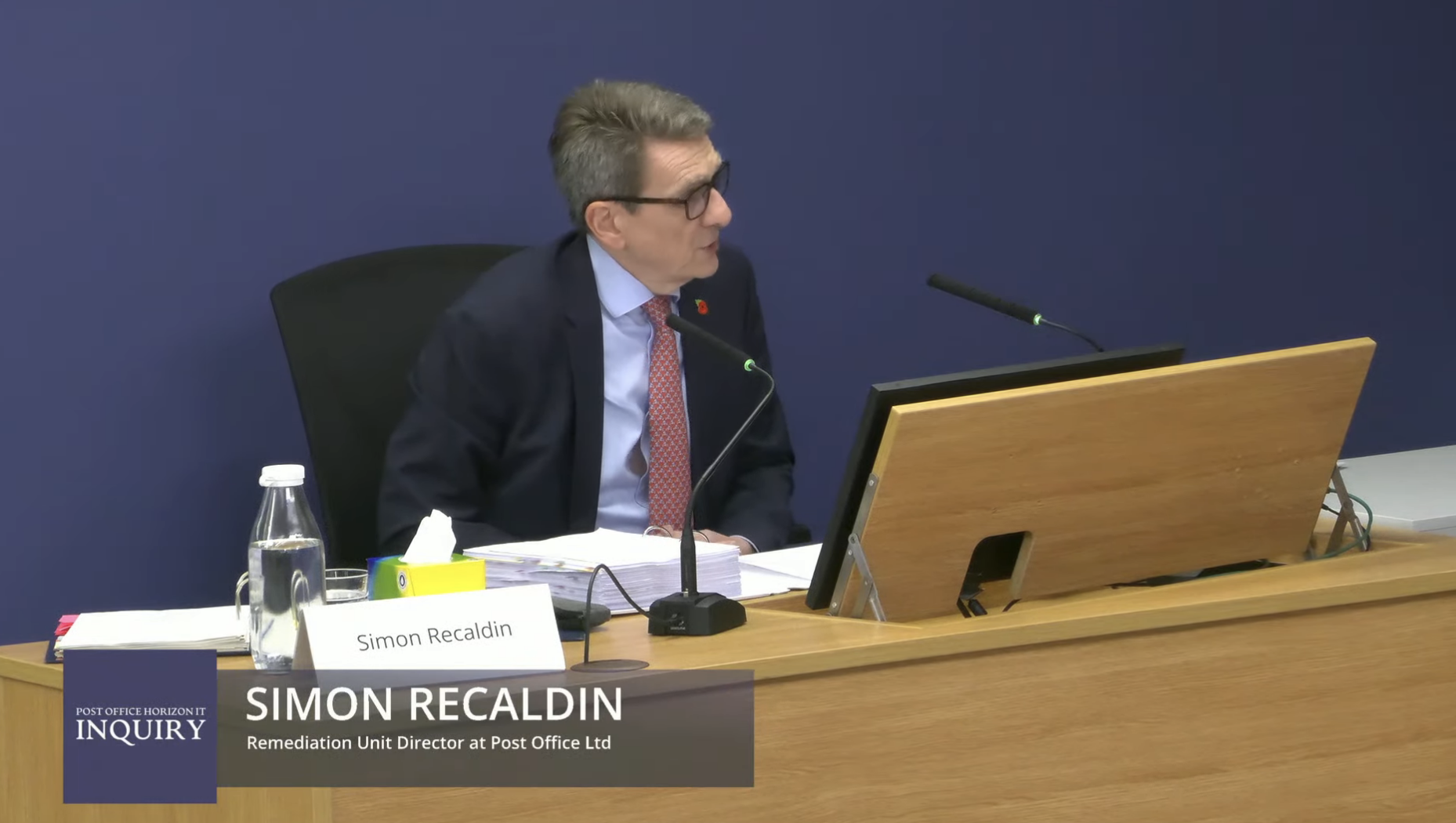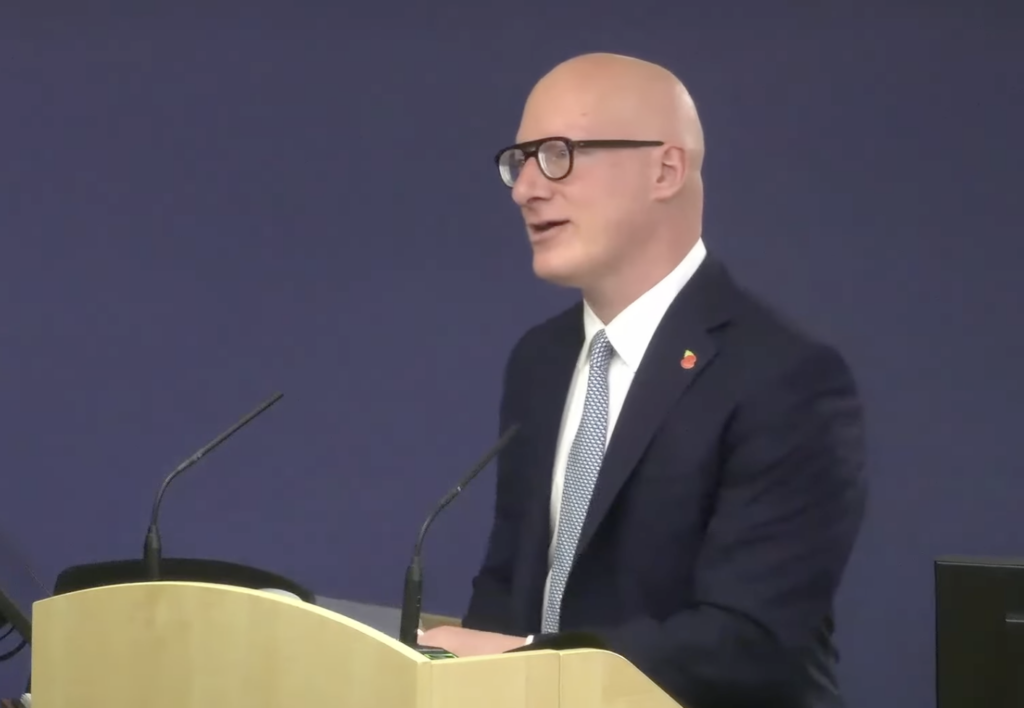
Simon Recaldin is the director of the Post Office remediation unit. He is also the last Post Office person to give evidence to the Inquiry. I sincerely hope one day he agrees to be interviewed by a journalist because the imprecision of some of his answers at the Inquiry today were maddening.
This morning, Recaldin was taken to an email chain started on 1 Dec 2023 in which he congratulated a large number of Post Office people for having issued “the last HSS [Horizon Scandal Scheme] offer from the original cohort” of applicants. The Horizon Scandal Scheme (initially called the Historical Shortfall Scheme) was mandated by the Bates v Post Office group litigation settlement agreement and was designed specifically for those outside the group litigation who might have a civil claim against the Post Office. The last of the original cohort of applications was received when the scheme closed prematurely in November 2020. Despite it taking three years to issue the last offer, Recaldin told the email recipients. “This is a significant milestone and one to be recognised. It also calls for me to recognise all of you for a job superbly executed.”
Totally Loony
Among the recipients were Rodric Williams – the Post Office lawyer who directed the internal legal response to attacks on Horizon integrity throughout the scandal. He described one Subpostmaster campaigner as a “bluffer” and admitted to the Inquiry he had a “bunker mentality” when it came to helping the Post Office defend Horizon at all costs. Caroline Richards worked alongside the “mafia gangster” Stephen Bradshaw in the Post Office investigations unit and helped put an innocent women in prison. Another email recipient was Melanie Corfield from the comms team, who had helped craft the Post Office response to the BBC’s 2015 Panorama, calling the investigation “inaccurate”, “partial” and “misleading”. Corfield also called claims about remote access to the Horizon IT system as “totally loony” and described James (now Lord) Arbuthnot as “deranged”.
Recaldin said the distribution list for the 2023 email went beyond those who worked in his remediation unit, but covered “anybody involved or who helped” in remediation.

Julian Blake questioned Recaldin on behalf of the Inquiry. He asked: “Around that time, late 2023, did you have concerns regarding people working in the remediation unit who had those kinds of past roles and past involvements in matters that the Inquiry is investigating?”
“Yes”, replied Recaldin, simply. Blake did not ask why. Instead he noted the email had been forwarded to the Post Office CEO, Nick Read.
Blake asked: “Were you aware at that time of any concerns that Nick Read, for example, had about those kinds of individuals working within the remediation units?”
“Yes.” replied Recaldin.
“Did you see it as a high priority to address?” asked Blake again.
“Yes.” replied Recaldin. Again, Blake did not dig into either of those answers. Maybe it’s obvious, but it would be nice to hear it on the record.
They have all done nothing wrong
We were left instead trying to piece things together from Recaldin’s elliptical replies. It transpired the Post Office had seen nothing wrong in continuing to employ people who either had a direct hand in prosecuting innocent people, or participating in a potential cover-up until March 2023. The matter only became of interest, when former contracts manager Brian Trotter gave evidence to the Inquiry, and revealed he had been re-hired by the Post Office to work in Recaldin’s remediation unit. Cue outrage from the Subpostmasters and their legal representatives. Trotter is an all-round dim bulb accused during the Bates v Post Office litigation of helping ruin a Subpostmaster’s livelihood. He was described by the judge as “extremely nervous” about giving evidence “that he thought might be unhelpful to the Post Office”.
“Why does it take an inquiry to realise that people who worked as investigators, for example, might be people that you don’t want in the team that’s deciding compensation and redress?” asked Blake.
“I think that’s an excellent question,” replied Recaldin “And one that certainly wasn’t addressed at the time. So when that team was built, I don’t think that was taken formally into consideration.”
Why not?! We don’t know, because he wasn’t asked, but one thing Recaldin could tell us is that of the 27 people eventually investigated during a Past Roles Review was that Trotter, Richards, Williams and Corfield et al “have done nothing wrong”. It was, according to Recaldin, merely a matter of “optics”.
Blake asked why the Past Roles Review took so long to start making recommendations about people working in the remediation team.
“Inactivity”, Recaldin replied. Eventually he opened up: “There is some serious challenges in Post Office around decision-making… and therefore potentially elongating processes and… this is not appropriate wording but kicking things into long grass.”
Pushed to elaborate, Recaldin said employing Trotter “should never have happened. It’s outrageous that that was allowed to happen. It’s a blatant conflict of interest.” Yet the Post Office was “a cauldron of indecisiveness” to the extent that getting rid of Brian Trotter at the end of his contract was “one of the most difficult things I’ve had to do in Post Office, in terms of working the system in order to exit Mr Trotter when his fixed-term contract simply expired in mid-2023.”
Come again? The Post Office can’t get rid of people whose contracts have come to an end? Apparently so, with Recaldin insisting it was “one of the most difficult things I had to go through in terms of engagement with the right people and the appropriate actions to be taken”.
The reason, apparently was that “this is optical because there’s no evidence here that these people are involved in decision-making. They’re just involved in a process.”
Either there was a blatant conflict of interest or there wasn’t, Mr Recaldin. It isn’t all just optics.
Blame the Culture
Even when trying to be direct and candid, Recaldin’s inability or oblique unwillingness to express exactly what he means led to a startling speech during which he seemed close to tears. He told the Inquiry:
“We’re in a very sensitive environment. Post Office is shot to pieces, okay, it is absolutely… and therefore everybody is extremely sensitive. Nobody wants to make a decision, okay, and every decision they worry about the consequences of making a decision, and there’s been in this environment quite understandably because of the bad place the Post Office has been in, and by the way, you know… it’s all true. So it’s such a bad place, but the culture is absolutely cl…. The culture that I’ve experienced, and I have to caveat that, is that only the bit that I’ve experienced, that I have seen culture within Post Office elsewhere, you know, in the retail business, in procurement, etc, in many other areas, communications, where… the culture is clearly not like this.
“The area I work in, the culture is very, very challenging and to answer your question is… there is this environment. You know, [he gets emotional] I feel very strongly about this. I… I’ve worked for 35 years, 38 years now I’ve worked… and for the best part of 35 years I’ve worked for Nat West Royal Bank of Scotland, going through a number of different management levels. And for 25 years of those, I’ve managed people either from one team up to over a thousand, and during those 25 years of managing people, I’ve never ever had a grievance against me. I’ve never had an investigation about me about anything. And this is very personal, Mr Blake, I hope you don’t mind me sharing it, and I feel very strongly about this. And in those 25 years, never an investigation, never a grievance, nothing… I’ve worked for three years in Post Office and I’ve been investigated five times Mr Blake. [long pause] You’ve asked me, who do you blame? I don’t blame an individual. I don’t blame anybody. I blame the culture that I face.”
Once more, he was not asked why.
This is a review of some of Recaldin’s evidence from yesterday.
The journalism on this blog is crowdfunded. If you would like to join the “secret email” newsletter, please consider making a one-off donation. The money is used to keep the contents of this website free. You will receive irregular, but informative email updates about the Post Office Horizon IT scandal.

Leave a Reply